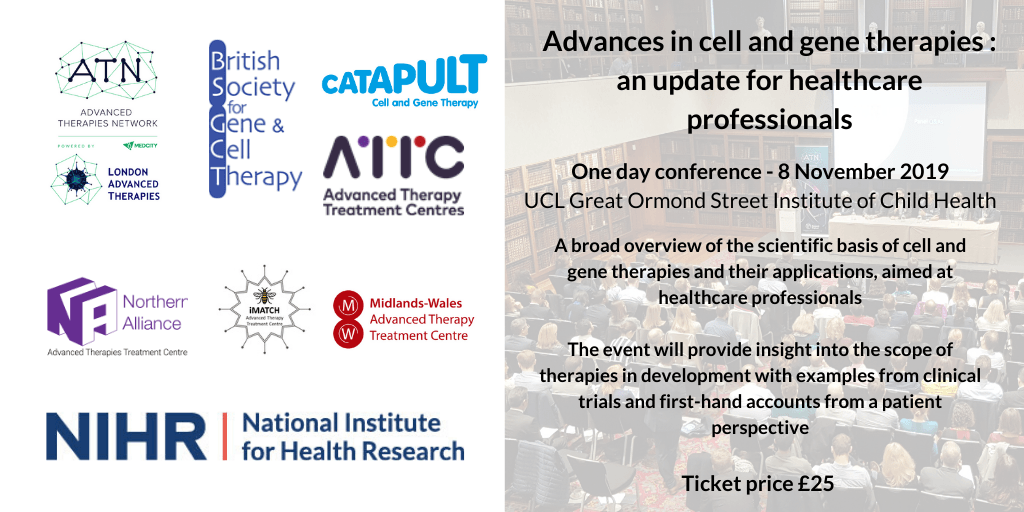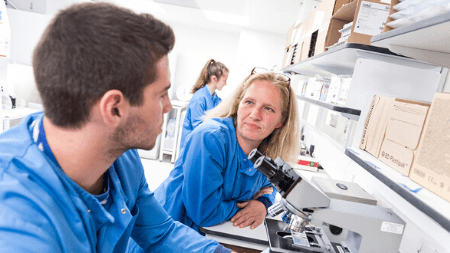
Why it’s time to train healthcare professionals in cell and gene therapies
On 8 November the Advanced Therapies Network joined several partners in the field to organise a training conference for healthcare professionals in London. Here, Prof. Uta Griesenbach, President of the British Society for Gene and Cell Therapy talks about the rationale behind the conference, the challenges for training in this area and plans for the future.
What was the rationale behind organising this one day conference professionals on cell and gene therapies?
Cell and gene therapies are already in use in the NHS and the amount of licenced ATMPs are projected to increase rapidly over the next 10 years. However, the number of healthcare professionals that are familiar with ATMPs and their specific requirements does not match the number who are likely to be involved in treating patients in coming years. This lack of familiarity and skills amongst the healthcare professions has been recognised as a potential bottleneck in adopting ATMPs into the NHS and this is what this conference is trying to address.
A number of organisations are involved in this event: the Advanced Therapies Network, the Advanced Therapy Treatment Centre (ATTC) Network, the British Society of Gene and Cell Therapy (BSGCT), the Cell and Gene Therapy Catapult, the National Institute for Health Research Clinical Research Network (NIHR CRN) and London Advanced Therapies (LAT). Why have they come together for this conference and what would they like to see come out of it?
All the stakeholders have a common aim, which is to ensure that patients have access to cell and gene therapies as soon as possible. Workforce development is essential to this aim and the various organisations are working together to avoid duplication and ensure that any resources that are developed will be used as efficiently and effectively as possible to upskill the workforce.
Until now there has not been a lot of coordinated work in this area and, although there have been examples of training in different research-focussed centres, little has been done at a UK-wide level.
There are now 14 approved ATMPs in the UK with the potential for dozens of additional approvals in next decade (Alliance of Regenerative Medicine and BIA, 2019). Compared to other therapies and medicinal products, what are the major differences in administering ATMPs and caring for the patients who receive them?
There are a number of aspects to these therapies that make them very different to other more traditional medicines. To ensure patients are treated effectively and safely, healthcare professionals working in this area need to be aware of these differences and understand how they influence patient care.
- Cell and gene therapies are all biologics which means they involve gene therapy vectors, or gene modified cells, which makes them very complicated and expensive to manufacture. As such it is vital to prepare and administer them correctly to avoid wastage.
- Some therapies are patient specific and involve removing the cells from a single patient, modifying them and transplanting them back into the same patient. These very personalised medicines have specific requirements for tracking and handling that need to be adhered to for effective treatment.
- Each medicine has a very short shelf life so once it is ready to be administered there cannot be much delay otherwise they will lose their efficacy.
- Lastly, it is known that some ATMPs cause significant but manageable side effects and clinical staff involved in treating patients with these therapies must be aware of the potential side effect.
Taken together all these aspects of ATMPs means we have a very different type of therapy.
Is there any sense of how cell and gene therapies are currently perceived by healthcare professionals? Does the conference aim to facilitate discussion and engagement on this area with the healthcare community?
I think healthcare professionals based in research active centres are quite well informed about cell and gene therapies and tend to perceive these new medicines as advances in healthcare that can be life changing for patients. However, professionals who are not embedded in research active centres may not have access to information around ATMPs or context around their delivery and, without this, some aspects of these medicines such as viral vectors may raise questions and concerns.
One of the aims of the conference is to engage attendees in discussions. Experts will be available to answer specific questions and, where they can, reassure the community. On the day we are also planning to get input from different professional groups about the type and format of teaching material that they would find useful to help us plan for future conferences but also design e-learning and train-the-trainer materials. We want to make sure that any training in this area is as accessible as possible.
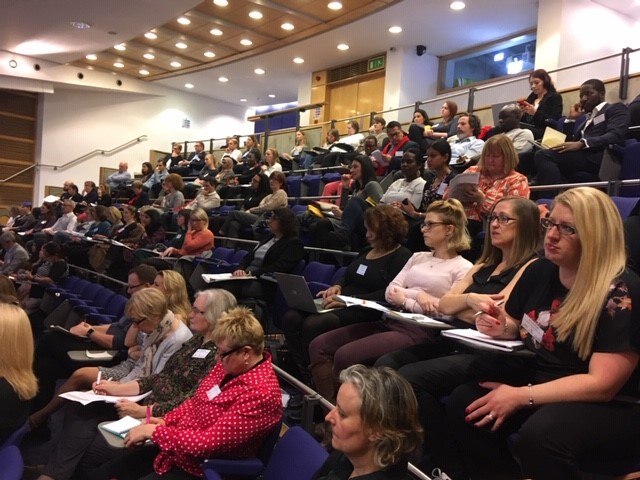
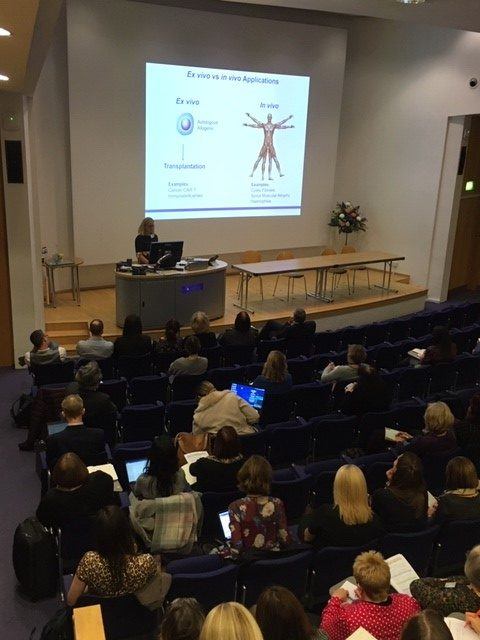
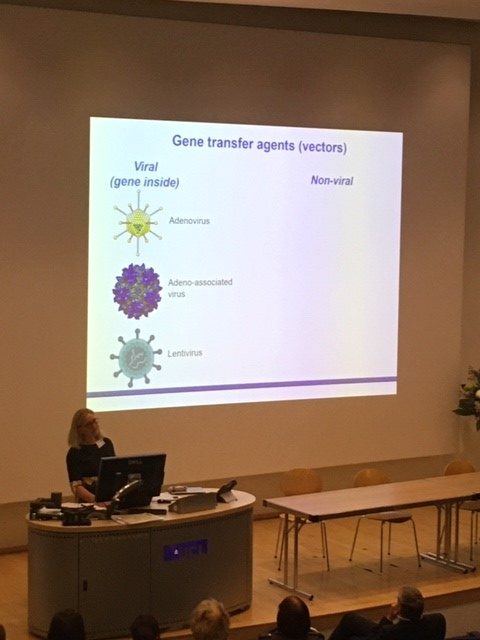
The number of patients who are receiving licensed cell and gene therapies is currently in the 100s and it is estimated this will reach 10,000 per year by 2018 (Cell and Gene Therapy Catapult Annual Review, 2019). What are the potential barriers to accelerating uptake in a clinical setting?
I think getting hospitals and GP surgeries ready for these therapies is potentially a large challenge, which can partly be addressed by workforce training.
Alongside this we must ensure there is the specialised infrastructure required to deliver these therapies safely and effectively, including areas such as containment and waste disposal.
What, if any, are the challenges in delivering training around ATMPs?
The first is upskilling such a large range of professional groups including nurses, pharmacists, GPs etc. but also training staff involved in clinical systems such as waste disposal and portering. Looking to the future there may need to be specific training for professional groups on how to handle ATMPS, and it may vary depending on different medicines.
I believe we also have to ensure the training is provided nationwide and not just exclusively among the research active community. Uptake is a ubiquitous challenge for any training and, even if we develop the best training materials, if healthcare professionals are not interested or engaged then we are not advancing the field.
In order to encourage engagement and uptake we are looking at accrediting the teaching and learning materials. We also need to ensure the materials are provided on an accessible platform and that the material remains up-to-date in such a rapidly developing field.
Are there any plans for future events or other training initiatives in this area?
In collaboration with all the stakeholders, we are aiming to provide training materials that can be useful across the country and for years to come. We hope to organise more conferences not just in London but around the country and we are planning to develop a series of e-learning modules.
We have developed a train-the trainer-initiative, which includes a slide deck to upskill key nursing staff across the country so they can then roll it out in their different communities.
In the longer term, we are planning to include material on ATMPs on professional courses, which could take the form of a four week module that can be bolted onto existing degree courses. At the moment this is just an aspiration but we are closely linked to groups that represent the individual professions to ensure we provide material that is useful for everyone.
We are still currently focussed on developing materials for the UK but international collaborations are something we have in mind for the future. My perception is that, within the EU, the UK is the furthest advanced in thinking around this area, meaning we could potentially share our learning and understanding in this area further afield.
‘Advances in cell and gene therapies: an update for healthcare professionals’ was held on Friday 8 November at UCL Great Ormond Street Institute for Child Health, London.
Uta Griesenbach is Professor in Molecular Biology at Imperial College London and President of the British Society for Gene and Cell Therapy. She was a speaker at the conference, alongside a range of other experts in this field, and patients who have received cell and gene therapies.
